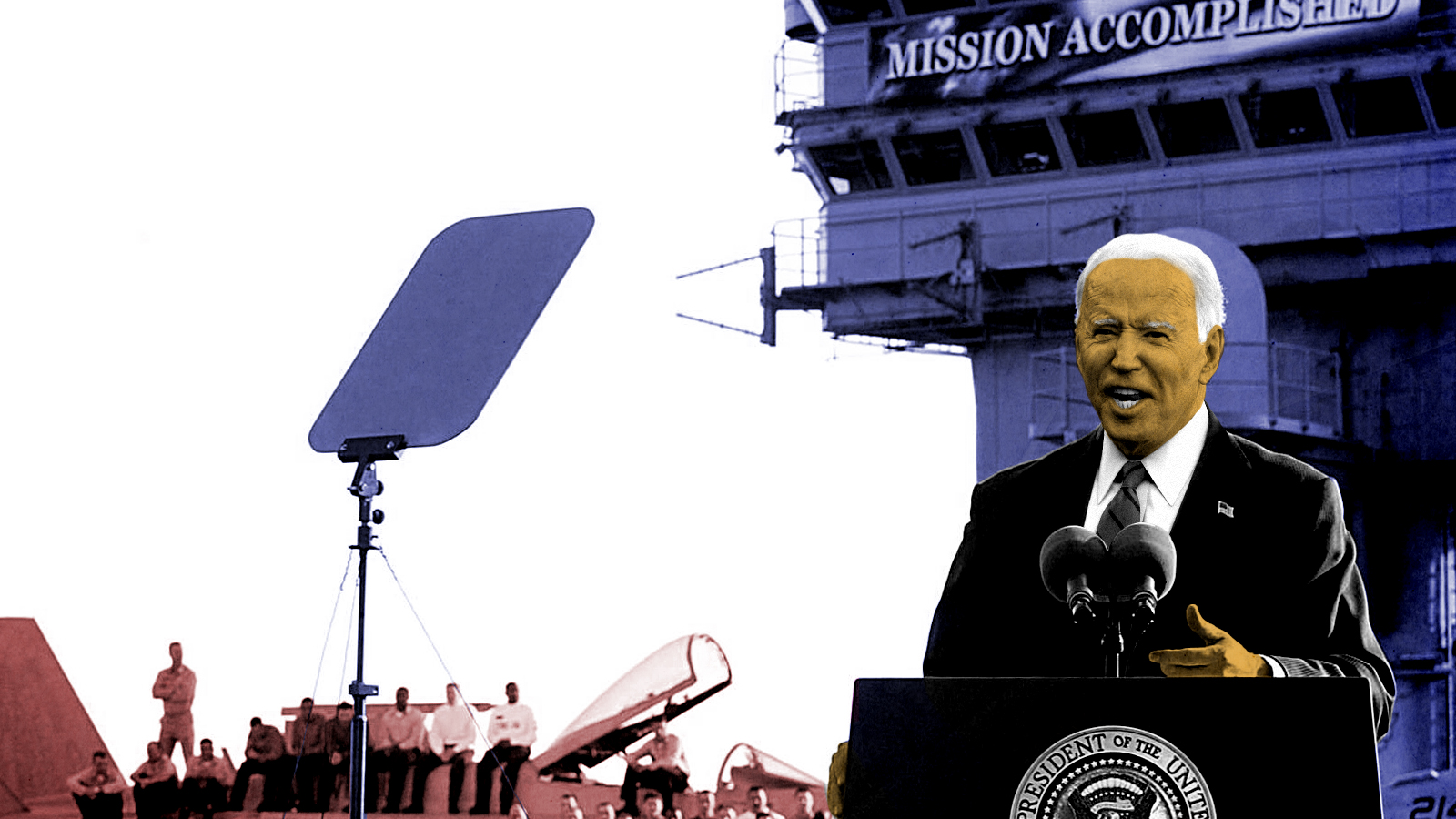Biden's 'mission accomplished' moment


A free daily email with the biggest news stories of the day – and the best features from TheWeek.com
You are now subscribed
Your newsletter sign-up was successful
"We have a deal," President Joe Biden said on Thursday, announcing an agreement between a bipartisan group of senators working on infrastructure legislation. It might just be his "Mission Accomplished" moment.
There are still many moving parts to passing the bipartisan infrastructure bill, so it's easy to see how the process could go off the rails. Democratic leaders, including President Biden, have promised the only way they will pass the bipartisan bill is if Congress also passes a second bill for "human infrastructure" using the budget reconciliation process that requires only majority support in the Senate. This includes a lot of stuff — a variety of social welfare and family assistance programs — that was stripped out of Biden's original infrastructure proposal in order to get an agreement with the five Republicans. If all goes as planned, Democrats will get most of what they wanted in the first place.
But there's reason to believe it won't. Already, Sen. Lindsey Graham (R-S.C.) has announced his opposition to the proposal. On the Senate side alone, getting the first bill done will take keeping all 50 Democrats together, plus (thanks to the filibuster) 10 Republicans. Just five Republicans were part of the bargaining process, and Senate Minority Leader Mitch McConnell implied the two-bill approach would risk Republican cooperation with either part.
The Week
Escape your echo chamber. Get the facts behind the news, plus analysis from multiple perspectives.

Sign up for The Week's Free Newsletters
From our morning news briefing to a weekly Good News Newsletter, get the best of The Week delivered directly to your inbox.
From our morning news briefing to a weekly Good News Newsletter, get the best of The Week delivered directly to your inbox.
Even if everything comes together, though, you have to wonder what has really been accomplished by this dragged-out dealmaking.
From a left-of-center point-of-view, the Democrats' plan sounds great: There are few things in politics better than having your cake and eating it too. But the effort reveals the essential hollowness of bipartisanship, at least as it is currently practiced. Two months of cross-party bargaining isn't going to change much about the intended end result, which suggests that all the haggling has been about apportioning credit: Both sides score points with the public for cooperation, Republicans get credit with their voters for supporting the parts of the infrastructure bill they like, and Democrats get credit from their supporters for passing the additional parts they want. Everybody gets to be for something.
The process, it turns out, was simply a branding exercise for all parties involved. Maybe there is some value in signaling to Americans that Republicans and Democrats can still work together in our polarized age. But it only works if everything passes, and right now that's far from certain.
A free daily email with the biggest news stories of the day – and the best features from TheWeek.com
Joel Mathis is a writer with 30 years of newspaper and online journalism experience. His work also regularly appears in National Geographic and The Kansas City Star. His awards include best online commentary at the Online News Association and (twice) at the City and Regional Magazine Association.
-
 6 of the world’s most accessible destinations
6 of the world’s most accessible destinationsThe Week Recommends Experience all of Berlin, Singapore and Sydney
-
 How the FCC’s ‘equal time’ rule works
How the FCC’s ‘equal time’ rule worksIn the Spotlight The law is at the heart of the Colbert-CBS conflict
-
 What is the endgame in the DHS shutdown?
What is the endgame in the DHS shutdown?Today’s Big Question Democrats want to rein in ICE’s immigration crackdown
-
 Big-time money squabbles: the conflict over California’s proposed billionaire tax
Big-time money squabbles: the conflict over California’s proposed billionaire taxTalking Points Californians worth more than $1.1 billion would pay a one-time 5% tax
-
 The ‘mad king’: has Trump finally lost it?
The ‘mad king’: has Trump finally lost it?Talking Point Rambling speeches, wind turbine obsession, and an ‘unhinged’ letter to Norway’s prime minister have caused concern whether the rest of his term is ‘sustainable’
-
 Did Alex Pretti’s killing open a GOP rift on guns?
Did Alex Pretti’s killing open a GOP rift on guns?Talking Points Second Amendment groups push back on the White House narrative
-
 Washington grapples with ICE’s growing footprint — and future
Washington grapples with ICE’s growing footprint — and futureTALKING POINTS The deadly provocations of federal officers in Minnesota have put ICE back in the national spotlight
-
 Trump’s Greenland ambitions push NATO to the edge
Trump’s Greenland ambitions push NATO to the edgeTalking Points The military alliance is facing its worst-ever crisis
-
 Why is Trump threatening defense firms?
Why is Trump threatening defense firms?Talking Points CEO pay and stock buybacks will be restricted
-
 The billionaires’ wealth tax: a catastrophe for California?
The billionaires’ wealth tax: a catastrophe for California?Talking Point Peter Thiel and Larry Page preparing to change state residency
-
 Trump considers giving Ukraine a security guarantee
Trump considers giving Ukraine a security guaranteeTalking Points Zelenskyy says it is a requirement for peace. Will Putin go along?
